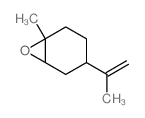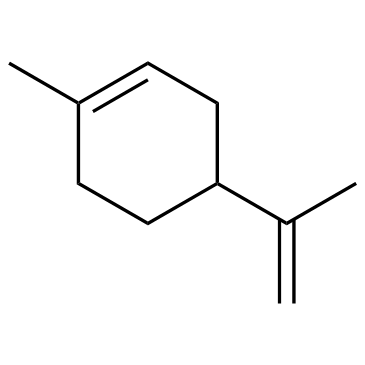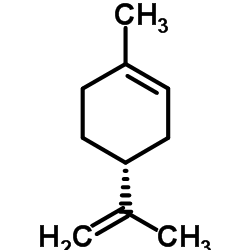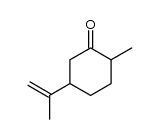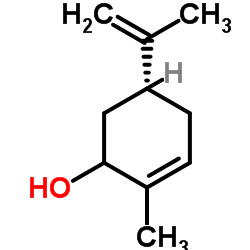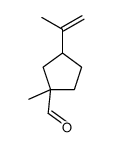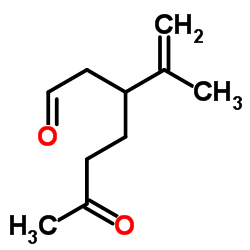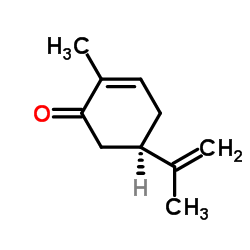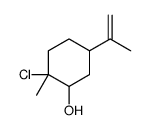1195-92-2
| 中文名 | (R)-氧化柠檬烯 |
|---|---|
| 英文名 | limonene 1,2-epoxide |
| 中文别名 |
1-甲基-4-(1-甲基乙烯基)-7-氧杂二环[4.1.10]-庚烷
1,8-萜二烯单氧化物 (+)-氧化柠檬烯 |
| 英文别名 |
Limonene 1,2-oxide
cis/trans-Epoxy-p-menth-8-ene 7-Oxabicyclo[4.1.0]heptane,1-methyl-4-(1-methylethenyl) Limonene 1,2-epoxide 2-(3,4-epoxy-4-methyl-cyclohexyl)propene Limonene monoxide 1,2-Epoxy-p-menth-8-ene 6-methyl-3-prop-1-en-2-yl-7-oxabicyclo[4.1.0]heptane 3-isopropenyl-6-methyl-7-oxabicyclo[4.1.0]-heptane Limonene epoxide MFCD00074770 Limonene oxide cis/trans-Epoxydipentene 1,2-Epoxylimonene p-Menth-8-ene,1,2-epoxy |
| 密度 | 0.929 g/mL at 25ºC(lit.) |
|---|---|
| 沸点 | 112 - 113ºC at 50 mm Hg |
| 分子式 | C10H16O |
| 分子量 | 152.23300 |
| 闪点 | 150 °F |
| 精确质量 | 152.12000 |
| PSA | 12.53000 |
| LogP | 2.52010 |
| 外观性状 | 透明至淡黄色液体 |
| 蒸汽压 | 0.515mmHg at 25°C |
| 折射率 | n20/D 1.466(lit.) |
| 储存条件 | 保持贮藏器密封、储存在阴凉、干燥的地方,确保工作间有良好的通风或排气装置 |
| 稳定性 | 如果遵照规格使用和储存则不会分解,未有已知危险反应,避免氧化物 |
| 分子结构 | 1、 摩尔折射率:45.31 2、 摩尔体积(m3/mol):156.5 3、 张比容(90.2K):369.4 4、 表面张力(dyne/cm): 31.0 5、 介电常数:无可用 6、 偶极距(10 -24cm 3):无可用 7、 极化率:17.96 |
| 计算化学 | 1.疏水参数计算参考值(XlogP):2.5 2.氢键供体数量:0 3.氢键受体数量:1 4.可旋转化学键数量:1 5.互变异构体数量:无 6.拓扑分子极性表面积12.5 7.重原子数量:11 8.表面电荷:0 9.复杂度:197 10.同位素原子数量:0 11.确定原子立构中心数量:0 12.不确定原子立构中心数量:3 13.确定化学键立构中心数量:0 14.不确定化学键立构中心数量:0 15.共价键单元数量:1 |
| 更多 | 1. 性状:未确定 2. 密度(g/mL,25℃):0.929 3. 相对蒸汽密度(g/mL,空气=1):未确定 4. 熔点(ºC):未确定 5. 沸点(ºC,常压):未确定 6. 沸点(ºC,228mm):113-114 7. 折射率(n20/D):1.466 8. 闪点(ºF):150 9. 比旋光度(º):未确定 10. 自燃点或引燃温度(ºC):未确定 11. 蒸气压(psi,55ºC):未确定 12. 饱和蒸气压(kPa,60ºC):未确定 13. 燃烧热(KJ/mol):未确定 14. 临界温度(ºC):未确定 15. 临界压力(KPa):未确定 16. 油水(辛醇/水)分配系数的对数值:未确定 17. 爆炸上限(%,V/V):未确定 18. 爆炸下限(%,V/V):未确定 19. 溶解性:未确定 |
Synonym:1-Methyl-4-(1-methylethenyl)-7-oxabicyclo(4.1.0)heptane; 1-Methyl-4-(1-methylvinyl)-7-oxabicyclo[4.1.0]heptane; 7-Oxabicyclo(4.1.0)heptane, 1-methyl-4-(1-methylethenyl)-; 7-Oxabicyclo[4.1.0]heptane, 1-methyl-4-(1-methylethenyl)-; Bicyclo[4 Section 2 - COMPOSITION, INFORMATION ON INGREDIENTS
Risk Phrases: None Listed. Section 3 - HAZARDS IDENTIFICATION EMERGENCY OVERVIEW
Moisture sensitive.The toxicological properties of this material have not been fully investigated. Potential Health Effects Eye: May cause eye irritation. May cause chemical conjunctivitis and corneal damage. Skin: May cause irritation and dermatitis. May cause cyanosis of the extremities. Ingestion: May cause gastrointestinal irritation with nausea, vomiting and diarrhea. The toxicological properties of this substance have not been fully investigated. Inhalation: May cause respiratory tract irritation. The toxicological properties of this substance have not been fully investigated. Aspiration may lead to pulmonary edema. Inhalation at high concentrations may cause CNS depression and asphixiation. Chronic: No information found. Section 4 - FIRST AID MEASURES Eyes: Flush eyes with plenty of water for at least 15 minutes, occasionally lifting the upper and lower eyelids. Get medical aid. Skin: Get medical aid. Flush skin with plenty of water for at least 15 minutes while removing contaminated clothing and shoes. Wash clothing before reuse. Ingestion: Never give anything by mouth to an unconscious person. Get medical aid. Do NOT induce vomiting. If conscious and alert, rinse mouth and drink 2-4 cupfuls of milk or water. Inhalation: Remove from exposure and move to fresh air immediately. If not breathing, give artificial respiration. If breathing is difficult, give oxygen. Get medical aid. Notes to Physician: Section 5 - FIRE FIGHTING MEASURES General Information: As in any fire, wear a self-contained breathing apparatus in pressure-demand, MSHA/NIOSH (approved or equivalent), and full protective gear. During a fire, irritating and highly toxic gases may be generated by thermal decomposition or combustion. Use water spray to keep fire-exposed containers cool. Vapors may be heavier than air. They can spread along the ground and collect in low or confined areas. Containers may explode when heated. Combustible liquid and vapor. Extinguishing Media: Use water spray to cool fire-exposed containers. Do NOT get water inside containers. Use water spray, dry chemical, carbon dioxide, or appropriate foam. Section 6 - ACCIDENTAL RELEASE MEASURES General Information: Use proper personal protective equipment as indicated in Section 8. Spills/Leaks: Absorb spill with inert material (e.g. vermiculite, sand or earth), then place in suitable container. Clean up spills immediately, observing precautions in the Protective Equipment section. Remove all sources of ignition. Use a spark-proof tool. Provide ventilation. Do not get water inside containers. Section 7 - HANDLING and STORAGE Handling: Wash thoroughly after handling. Remove contaminated clothing and wash before reuse. Use only in a well-ventilated area. Avoid contact with eyes, skin, and clothing. Empty containers retain product residue, (liquid and/or vapor), and can be dangerous. Keep container tightly closed. Avoid ingestion and inhalation. Do not allow contact with water. Do not pressurize, cut, weld, braze, solder, drill, grind, or expose empty containers to heat, sparks or open flames. Keep from contact with moist air and steam. Keep away from heat and flame. Storage: Keep away from sources of ignition. Store in a tightly closed container. Store in a cool, dry, well-ventilated area away from incompatible substances. Store protected from moisture. Section 8 - EXPOSURE CONTROLS, PERSONAL PROTECTION Engineering Controls: Facilities storing or utilizing this material should be equipped with an eyewash facility and a safety shower. Use adequate general or local explosion-proof ventilation to keep airborne levels to acceptable levels. Exposure Limits CAS# 1195-92-2: Personal Protective Equipment Eyes: Wear appropriate protective eyeglasses or chemical safety goggles as described by OSHA's eye and face protection regulations in 29 CFR 1910.133 or European Standard EN166. Skin: Wear appropriate protective gloves to prevent skin exposure. Clothing: Wear appropriate protective clothing to prevent skin exposure. Respirators: A respiratory protection program that meets OSHA's 29 CFR 1910.134 and ANSI Z88.2 requirements or European Standard EN 149 must be followed whenever workplace conditions warrant respirator use. Section 9 - PHYSICAL AND CHEMICAL PROPERTIES Physical State: Clear liquid Color: clear, colorless Odor: None reported. pH: Not available. Vapor Pressure: Not available. Viscosity: Not available. Boiling Point: 113.0 - 114.0 deg C @ 50.00mm Freezing/Melting Point: Not available. Autoignition Temperature: Not applicable. Flash Point: 65 deg C ( 149.00 deg F) Explosion Limits, lower: Not available. Explosion Limits, upper: Not available. Decomposition Temperature: Not available. Solubility in water: Not available. Specific Gravity/Density: .9290g/cm3 Molecular Formula: C10H16O Molecular Weight: 152.24 Section 10 - STABILITY AND REACTIVITY Chemical Stability: Stable under normal temperatures and pressures. Conditions to Avoid: Ignition sources, moisture, excess heat. Incompatibilities with Other Materials: Strong oxidizing agents, moisture. Hazardous Decomposition Products: Carbon monoxide, carbon dioxide. Hazardous Polymerization: Has not been reported. Section 11 - TOXICOLOGICAL INFORMATION RTECS#: CAS# 1195-92-2: RN8761000 LD50/LC50: CAS# 1195-92-2: Inhalation, rat: LC50 = 60000 mg/m3; Oral, mouse: LD50 = 2700 uL/kg; Oral, rat: LD50 = 3.8 mL/kg. Carcinogenicity: (+)-Limonene oxide, mixture of cis and trans - Not listed by ACGIH, IARC, or NTP. Other: See actual entry in RTECS for complete information. Section 12 - ECOLOGICAL INFORMATION Section 13 - DISPOSAL CONSIDERATIONS Dispose of in a manner consistent with federal, state, and local regulations. Section 14 - TRANSPORT INFORMATION IATA Not regulated as a hazardous material. IMO Not regulated as a hazardous material. RID/ADR Shipping Name: Not regulated. Hazard Class: UN Number: Packing group: Section 15 - REGULATORY INFORMATION European/International Regulations European Labeling in Accordance with EC Directives Hazard Symbols: Not available. Risk Phrases: Safety Phrases: S 24/25 Avoid contact with skin and eyes. S 28A After contact with skin, wash immediately with plenty of water. S 37 Wear suitable gloves. S 45 In case of accident or if you feel unwell, seek medical advice immediately (show the label where possible). WGK (Water Danger/Protection) CAS# 1195-92-2: 1 Canada CAS# 1195-92-2 is listed on Canada's DSL List. CAS# 1195-92-2 is not listed on Canada's Ingredient Disclosure List. US FEDERAL TSCA CAS# 1195-92-2 is listed on the TSCA inventory. SECTION 16 - ADDITIONAL INFORMATION N/A |
|
毒理学数据: 1、急性毒性:小鼠注入肌肉LD50:100mg/kg 生态学数据: 对水是稍微有危害的不要让未稀释或大量的产品接触地下水、水道或者污水系统,若无政府许可,勿将材料排入周围环境。 CHEMICAL IDENTIFICATION
HEALTH HAZARD DATAACUTE TOXICITY DATA
|
| 上游产品 3 | |
|---|---|
| 下游产品 8 | |


